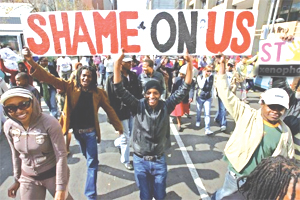Do South Africans Have an Identity as a Nation?

 |
| Anti-xenophobia protest in SA Photo courtesy |
An identity in this context refers to who or what South Africans are, the characteristics determining who or what they are. There must be something that makes South Africans who or what they are, something common among them, an identity. What is it? A passport, as suggested on Mgabadeli’s show? A forged one also? Or a myriad of other preposterous and nebulous things that were brought up on that show which have nothing do with our national identity?
A national identity relates an individual to his/her people. South Africa is an African country, inhabited mostly by African people. Our identity cannot be determined by non-African minorities even if they live in South Africa. The fact that some people in South Africa do not fit into the description of our national identity doesn’t mean it’s not important; we have multiple identities or it doesn’t exist as Mgabadeli’s guest claimed. Does our national identity exist? What is this identity?
There are three factors which make up the collective personality of a people. They are the historical factor, linguistic factor and psychological factor. As cultural historian and linguist, Dr Cheikh Anta Diop points out that these factors are undergoing constant change, particularly the psychological aspects, while the linguistic and historic aspects provide coordination of relationships.
Blacks in the Diaspora have had the linguistic ties cut but the historic factor remains as strong as ever, perpetuated by memory. By the same token, the cultural heritage of Africa is obvious in the Americans and attests to the continuity of cultural customs. Diop continues to say that the historic factor is the cultural cement which unites the disparate elements of a people to make a whole. Historical consciousness is the most solid rampart of the cultural security of a people. Historical continuity is the effective cultural arm of a people against outside cultural aggression.
The linguistic factor is important in cultural identity. That’s why it is important to seek the unifying elements of our many languages. The minorities whose forebears came to South Africa in the seventeenth and nineteenth centuries are not prepared to learn our languages because of their erstwhile dominant and privileged status. That’s why they say we don’t have a national identity. They want to make English our lingua franca. Unity based on a foreign language is tantamount to cultural abortion which would reduce us to perpetual copycats.
We have a national identity, the particular sensibility of an African, or ‘African soul’, the idiosyncrasies of Mgabadeli and her guest on last week’s radio show notwithstanding. The African soul or African sensibility has influenced the material existence and creativity of African peoples. This has been established by using the structures evolved by ancient African societies as a basis, such as family structure, clannic and tribal organisation and the territorial state. These structures are the objective reflection of precise historical conditions and also of the African soul. We have a national identity, not multiple identities and our national identity is definitely important.
By Sam Ditshego
Mr Sam Ditshego did a post graduate certificate in Development Economics and Policy Making with the Southern and Eastern African Trade Information and Negotiations Institute.
